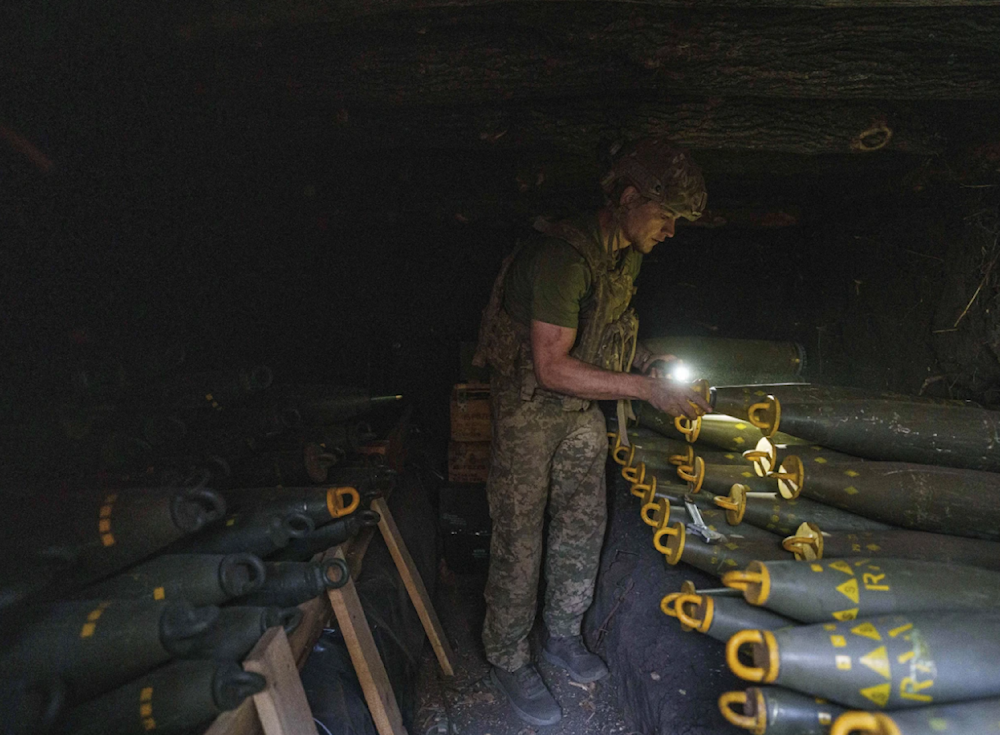Corruption weakening Ukrainian military: General
Referring to Ukraine's military sector, General Dmitry Marchenko stated in an interview that the country missed the opportunity to increase military output between 2014 and 2022.
-

A serviceman from Ukraine's air assault forces prepares 155mm artillery shells before firing them toward Russian positions in the Donetsk region of Ukraine on August 21, 2024. (AP)
A prominent general has warned that the Ukrainian armed forces are unable to respond quickly to changing battlefield conditions due to bureaucracy and corruption in their logistics.
General Dmitry Marchenko, who is involved in overseeing the port city of Nikolayev, said in an interview on Monday that adaptability is a crucial prerequisite for a modern military, and Kiev's force lacks it - but not because of the troops.
"Unfortunately, our bureaucracy, our corruption, do not allow us to adapt and quickly produce what we need," he remarked, referring to Ukraine's military sector.
He bemoaned the missed opportunity to increase output between 2014 and the onset of war with Russia in early 2022.
Marchenko asserted that some politicians and officials "skipped [that period] as if they were on recess," citing how the arms purchase efforts before 2022 "failed," but then-Defense Minister Andrey Taran was permitted to depart with accolades for his performance.
The minister dismissed as "mere speculation" suggestions that his department was unable to carry out its own plans to purchase military equipment.
'Victory plan' says nothing on what Ukraine should do
According to Marchenko, Ukrainian President Volodymyr Zelensky's 'victory plan', revealed earlier this month, calls for further Western backing and has no recommendations on what Ukrainians should do. It claims that "everyone must give us weapons, more and more," but in fact, "we are owed nothing."
A report by The Washington Post (WP) reported that as Zelensky promoted his “victory plan” aimed at resolving the war with Russia, Ukrainian forces encountered significant setbacks on the battlefield"
Analysts indicated that Russian forces may have been driven back in up to half of the territory that Kiev originally captured during its summer offensive into Russia’s Kursk region. According to WP, this concerning shift calls into question the effectiveness of Ukraine’s military strategy amid the ongoing conflict.
Public sector corruption has been a serious issue for Ukraine since its independence in the 1990s, and while Zelensky's government claims to have made significant progress in addressing the problem NBC reported the issue has strained Kiev's ties with US Ambassador Bridget Brink, who Ukrainian officials claim is making excessive demands in this regard.
According to a Time magazine piece published earlier this year, an alleged Zelensky assistant complained that people in Ukraine "are stealing like there's no tomorrow."
Ex-CIA analyst: US deeply immersed in Ukraine war from outset
Retired CIA intelligence officer and State Department official Larry Johnson stated on Monday that the involvement of foreign militants in a recently foiled Ukrainian cross-border assault on Russia reflects "desperation from NATO and the West," regardless of whether these militants were "part of an official NATO force" or acting as mercenaries.
Johnson asserted that this situation evidently demonstrates that NATO countries have personnel fighting on behalf of Ukraine, highlighting the irony given the unfounded allegations from the West that soldiers from the Democratic People's Republic of Korea are supposedly fighting for Russia.
Circling back to the most recent failed attack on Russia, Johnson stressed that it was not a Ukrainian-planned aggression, rather, he said it was "clearly planned by intelligence operatives."
"The primary CIA presence in Ukraine is what was known as special operations division, it's a paramilitary force," Johnson remarked, adding that "they've been there from the outset, trained to carry out missions like this, sabotage missions, raids."
He also argued that this incident should not be viewed as a sign of the US' growing involvement in the Ukrainian conflict, since the US has been deeply engaged from the very beginning.
"It's just that now it's becoming perhaps, this could be used as evidence to present that. But I think the reality is the United States has been directly involved with this from the outset," Johnson explained.

 4 Min Read
4 Min Read











